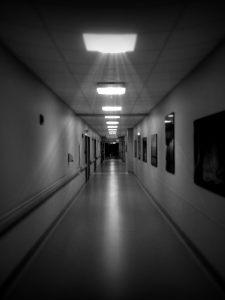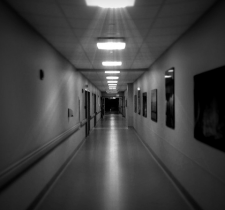Stand There: Ministry of Presence in a Medical World

I am a tall, young, female chaplain with a penchant for costume jewelry and leopard print accessories. When there’s a death or a trauma, I introduce myself to the family. “I’m Caroline, the chaplain. I’m here for your support,” I say, furrowing my brow and mustering all the earnest concern I can. They look up with red-rimmed eyes, say, “You’re a funny-looking chaplain.”
During my 24-hour on-call shifts, I sleep in a converted old hospital room with the same millimeters-thin blanket and industrial sheets as my patients. Someone has added a dresser, a rocking chair, and a lamp. No one has bothered to remove the “code blue” panic button—pushed when a patient’s heart stops —from the concrete brick wall. They are remodeling this wing of the hospital, and so some nights there is a constant hammering interspersed with the angry buzz of a chain saw from the empty rooms next door.
When I get a page, I rouse and scan the details. “50-year-old man, gunshot wound, level two trauma, 30 mins. out,” for example. I groan and roll over. There’s a misconception that chaplains never curse; I can tell you from working overnights, it is not true. I set my alarm for 20 minutes and savor the last few minutes of sleep before donning my blazer and badge.
Chaplains are out of place in the medical profession. In the hospital directory, my department—the Department of Spiritual Care and Wholeness—sits like an embroidered, life-affirming pillow among the medical pillars of pulmonology and oncology and gastroenterology. Everyday I ask the nurses on my unit if anyone could use emotional or spiritual support. They look at me like I have antlers.
Normally I must fight the current of nurses and techs spilling in and out of the trauma bay if I want to get information for a family. I get pushed aside, ignored.
But. If a child dies or a CPR is failing, or a leg needs amputating, I walk in the unit and the medical staff splits like a red sea.
I don’t have some secret the medical staff lacks. The role of the chaplain is just to embrace the emotion that others try to avoid. Sometimes the patient or family asks me for a cup of coffee, a Kleenex, an update from the doctors in the operating room. I’m asked to contact another family member. I do these things, but I try not to be reduced to my practical contributions.
Allowing others to feel what they feel is a form of hospitality. In The Wounded Healer, Nouwen writes that when we deal with our own issues of hurt and grief and insecurity, we are then able to be with others in their doubt and hardship. We are not so saturated with our own feelings that we cannot enter in. Of course, I can never fully resolve my own struggles; I will always be half-healed.
The Bible is full of unlikely characters, people that had no particular qualifications other than the fact that God called them. I feel the same way as I roam the hospital halls in the middle of the night. I can’t do chest compressions or insert feeding tubes or shock the heart into beating again. My pastoral authority grants me access to most secure areas of the hospital—the emergency room, the ICU, pediatrics—but all I have to offer is presence. I feel like dusty, sandal-clad Moses entering Pharaoh’s temple. I feel like Mary cowering before the angel Gabriel.
One night I entered the cath lab to get an update for the father of a patient who’d come in to the hospital with a heart attack in progress. Gathering all my courage and self-possession, I opened the surgery door and presented myself among the robed, masked surgeons. Before I could say a word, a doctor looked up at me and said, “There’s a scared girl here,” and quietly went back to his work of saving the man’s life.
My supervisor has a saying. Don’t just do something; stand there. We as chaplains testify to the ministry of presence, however homespun and inconsequential it sounds. We affirm the presence of a living, loving God in the darkest places of the hospital—the operating table, the dreaded family consultation room. Maybe it’s appropriate that the bearers of this presence arrive in strange packages. Who better to testify to the wildly improbable claim that God is present in the ER than a lanky, terrified white woman in leopard print flats?
On my way down from the on-call room, I sometimes pray, “Please don’t ask this of me.” I rub my eyes as they try to adjust to the fluorescent lights, pat my hair into some semblance of professionalism. I feel my own heart galvanize, speed up to hummingbird frequency as I walk toward the room, see the relieved nurses start to scatter, to let me do my work of sitting and waiting. I realize that tonight, yes, God is asking this of me. I tuck in my shirt; I look down at my ill-conceived choice in footwear; I inhale. I remember that wherever God sends me, I never go alone.
Caroline
Latest posts by Caroline (see all)
- Planting: a millennial’s guide to motherhood. - October 10, 2016
- A Net for Catching Days - December 1, 2015
- The Miracle of Flight - September 21, 2015

